|
|
|
Sort Order |
|
|
|
Items / Page
|
|
|
|
|
|
|
| Srl | Item |
| 1 |
ID:
157728
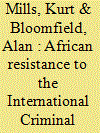

|
|
|
|
|
| Summary/Abstract |
The creation of the International Criminal Court (ICC) in 1998 marked a substantial advance in the effort to ensure all perpetrators of mass atrocities can be brought to justice. Yet significant resistance to the anti-impunity norm, and the ICC as the implementing institution, has arisen in Africa. The ICC has primarily operated in Africa, and since it sought to indict the sitting Sudanese President Omar al-Bashir in 2008 resistance from both individual African states and the African Union has increased substantially. We draw on the concept of ‘norm antipreneurs’, and the broader norm dynamics literature, to analyse how resistance has developed and manifested itself, as well as the potential effects of this resistance on the anti-impunity norm. We conclude that the antipreneur concept helped us structure and organise analysis of the case – suggesting it could be usefully deployed in other similar cases – but that this case also suggests that antipreneurs do not always enjoy substantial defensive advantages. We also conclude that African resistance to the ICC has substantially stalled the advance of the anti-impunity norm, a finding that has significant implications for the wider effort to reduce mass atrocity crimes in the contemporary era.
|
|
|
|
|
|
|
|
|
|
|
|
|
|
|
|
| 2 |
ID:
157724
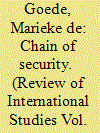

|
|
|
|
|
| Summary/Abstract |
Increasingly, private companies – including Twitter, airlines, and banks – find themselves in the frontline of fighting terrorism and other security threats, because they are obliged to mine and expel suspicious transactions. This analytical work of companies forms part of a chain, whereby transactions data are analysed, collected, reported, shared, and eventually deployed as a basis for intervention by police and prosecution. This article develops the notion of the Chain of Security in order to conceptualise the ways in which security judgements are made across public/private domains and on the basis of commercial transactions. Drawing on the work of Bruno Latour, this article understands the security chain as the set of practices whereby commercial transactions are collected, stored, transferred, and analysed, in order to arrive at security facts. Understanding the trajectory of the suspicious transaction as a series of translations across professional domains draws attention to the processes of sequencing, movement, and referral in the production of security judgements. The article uses the chain of financial suspicious transactions reporting as example to show how this research ‘thinking tool’ can work. In doing so, it aims to contribute to debates at the intersection between International Relations (IR) and Science-and-Technology Studies (STS).
|
|
|
|
|
|
|
|
|
|
|
|
|
|
|
|
| 3 |
ID:
157729
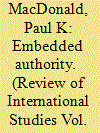

|
|
|
|
|
| Summary/Abstract |
Relations of sovereign inequality permeate international politics, and a growing body of literature grapples with the question of how states establish and sustain hierarchy amidst anarchy. I argue that existing literature on hierarchy, for all its diverse insights, misses what makes hierarchy unique in world politics. Hierarchy is not simply the presence of inequality or stratification among actors, but rather an authority relationship in which a dominant actor exercises some modicum of control over a subordinate one. This authority relationship, moreover, is dramatically different than ones found in domestic hierarchies. It is shaped less by written laws or formal procedures, than by subtle forms of manipulation and the development of informal practices. For this reason, hierarchy cannot simply be reduced the to the dynamics of anarchy, and must be viewed as a relational phenomenon. Ties between actors create positions that permit dominant actors to appropriate and orchestrate the sharing of authority with subordinate intermediaries. This article develops this relational network approach, highlighting how concepts such as access, brokerage, and yoking can illuminate the processes by which authority is enlisted and appropriated in world politics.
|
|
|
|
|
|
|
|
|
|
|
|
|
|
|
|
| 4 |
ID:
157731
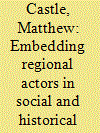

|
|
|
|
|
| Summary/Abstract |
The regionalisation of the world economy is one of the most important developments in global governance in the past two decades. This process has seen ‘inter-regional’ economic agreements emerge between two or more regional groupings. Drawing mainly on the European Union’s external relations, observers accordingly point to the growing importance of regional actors, explaining their agency (or ‘actorness’) with regional attributes such as (supranational) institutional design, size, and member state cohesion. This article challenges this dominant explanation of regional agency. It argues that regional actors are socially, politically, and historically ‘embedded’. Agency reflects the contingency of regional integration processes, the motivations that underpin those processes, and the specific relationships between regions and third parties. This approach explains an important case of inter-regionalism from the Asia-Pacific: CER-ASEAN relations. Since the early 1990s, Australia and New Zealand have used their ‘Closer Economic Relations’ trade agreement for relations with the Association of Southeast Asian Nations. This reflects the ambitions of Australasian officials to shape processes of Asian-Pacific regionalism, and the interests of ASEAN officials in consolidating their own process of transnational market-making. Here, regional agency owed to a transforming world economy and the reconceptualisation of regions within new networks of trade governance.
|
|
|
|
|
|
|
|
|
|
|
|
|
|
|
|
| 5 |
ID:
157723
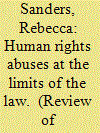

|
|
|
|
|
| Summary/Abstract |
Law following and law breaking are often conceptualised as polar opposites. However, authorities in liberal democracies increasingly deploy a strategy of what I call plausible legality in order to secure immunity and legitimacy for proscribed practices. Rather than ignore or suspend law, they construct legal justifications for human rights abuses and other dubious policies, obscuring the distinction between legal compliance and non-compliance. I argue this is possible because instabilities in legal rules make them vulnerable to manipulation and exploitation. By tracing American rationales for contentious ‘enhanced interrogation techniques’, indefinite detention, and ‘targeted killing’ practices in the ‘Global War on Terror’, I show that law need not always be abandoned or radically reconstituted to achieve troubling ends and that rule structures enable certain patterns of violation while limiting others. The international prohibition on torture is robust and universal, but provides vague definitions open to interpretation. Detention and lethal targeting regulations are jurisdictionally layered and contextually complex, creating loopholes and gaps. The article concludes by reflecting on implications for the protection of human rights. While law is not wholly indeterminate, human rights advocates must constantly advocate shared legal understandings that constrain state violence.
|
|
|
|
|
|
|
|
|
|
|
|
|
|
|
|
| 6 |
ID:
157725
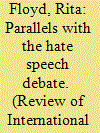

|
|
|
|
|
| Summary/Abstract |
This article argues that public expressions of Islamophobia are best understood as securitising requests (that is, calls on powerful figures/bodies to treat an issue in security mode so that extraordinary measures can be used to combat it), especially in those cases where Muslims are feared and disliked because of the perception that Islamic people are prone to terrorism. This article argues that harmful and derogatory securitising requests targeting racial, ethnic, or religious minorities are on par with hate speech and it highlights the fact that many contemporary societies are now seeking legal protections against such security speech (expressed most notably in the desire to ban Islamophobia). It is from this perspective that this article poses an important research question: With a view to protecting those adversely affected, are legal protections against harmful and offensive securitising requests justified? The research question can be answered by drawing parallels to the existing hate speech debate in legal and political theory. The research reveals that, although the case against legal protections of harmful and defamatory security speech is ultimately more convincing, security speech alone can be so damaging that it should be informed by a number of ethical considerations. This article goes on to suggest three criteria for governing the ethics of requesting securitisation. As such this article fills a lacuna in the ‘positive/negative debate’ on the ethics of security that has engaged with securitisation, but that has failed to consider the ethics of speaking security.
|
|
|
|
|
|
|
|
|
|
|
|
|
|
|
|
| 7 |
ID:
157730
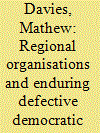

|
|
|
|
|
| Summary/Abstract |
Instead of asking whether regional organisations can promote democracy, a well-established conclusion, this article asks what type of democracy regional organisations can promote. Where their commitments to democracy are weak, regional organisations can promote the transition away from authoritarianism but cannot drive that process to completion with the creation of embedded liberal democracies. Under such circumstances regional organisations serve as regimes of bounded toleration, and can provide regional linkages that sustain defective democracies. Through examining the relationship between the Association of Southeast Asian Nations and Myanmar, three supporting roles are identified; regional legitimacy, defence from external pressure, and future-oriented accommodation. The presence of these linkages between defective democracies and regional organisations provides a caveat to the positive assessments of regional organisations as socialisers of democracy.
|
|
|
|
|
|
|
|
|
|
|
|
|
|
|
|
| 8 |
ID:
157726
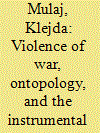

|
|
|
|
|
| Summary/Abstract |
This article considers a neglected question in International Relations, namely how violence of war contributes to the constitution of the political community at the intersection between war and peace. It exposes limitations of means-ends, instrumental understanding of war violence due to the overlooking of violence’s performative attributes stemming from the centrality of bodily injuries in war. The instrumental violence on which the constitution of the political community is grounded finds expression in an order of representation that can be termed ontopology, and a pervasive – circular – relationship between ontopology and violence insofar as ontopology has inspired extreme forms of human behaviour and also been used to justify violence as a means to enact an ontopological goal. Yet, recognising the role of bodily injuries in the course of fighting allows for a more complete understanding of war. Crucially it enables an interpretation of the structure of war as a relation between war’s interior content – casualties in war – and the exterior, verbal issues standing outside it (pertaining to security, identity, sovereignty, authority, ideology), that lead to a surrogate contest of reimagining political community in the process of which performative power of violence contributes directly to the emerging post-war peace and laws that justify it.
|
|
|
|
|
|
|
|
|
|
|
|
|
|
|
|
| 9 |
ID:
157727
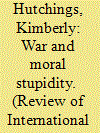

|
|
|
|
|
| Summary/Abstract |
This article uses the example of Wittgenstein’s decision to go to war in 1914 to frame a contrast between two different ways of thinking about moral stupidity and moral intelligence in relation to war, those of Jeff McMahan and Jane Addams. The article clarifies how pathways for thinking about the morality of war are blocked and enabled not only by different accounts of justice but also by different understandings of war. It is argued that if we want to be morally intelligent in our judgments about the ethics of war we should follow the pathway marked out by Addams and think less about justice and more about war.
|
|
|
|
|
|
|
|
|
|
|
|
|
|
|
|
|
|
|
|
|